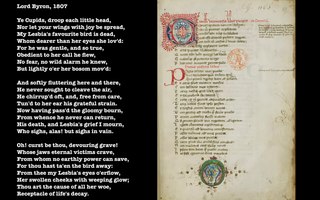Related Research Articles

The Lord's Prayer, often known by its incipit Our Father, is a central Christian prayer which Jesus taught as the way to pray. Two versions of this prayer are recorded in the gospels: a longer form within the Sermon on the Mount in the Gospel of Matthew, and a shorter form in the Gospel of Luke when "one of his disciples said to him, 'Lord, teach us to pray, as John taught his disciples'". Regarding the presence of the two versions, some have suggested that both were original, the Matthean version spoken by Jesus early in his ministry in Galilee, and the Lucan version one year later, "very likely in Judea".
An oxymoron is a figure of speech that juxtaposes concepts with opposite meanings within a word or in a phrase that is a self-contradiction. As a rhetorical device, an oxymoron illustrates a point to communicate and reveal a paradox. A general meaning of "contradiction in terms" is recorded by the 1902 edition of the Oxford English Dictionary.

The seven deadly sins, also known as the capital vices or cardinal sins, is a grouping and classification of vices within Christian teachings. According to the standard list, they are pride, greed, wrath, envy, lust, gluttony and sloth, which are contrary to the seven heavenly virtues. These sins are often thought to be abuses or excessive versions of one's natural faculties or passions.

Mammon in the New Testament of the Bible is commonly thought to mean money, material wealth, or any entity that promises wealth, and is associated with the greedy pursuit of gain. The Gospel of Matthew and the Gospel of Luke both quote Jesus using the word in a phrase often rendered in English as "You cannot serve both God and mammon."

In publishing and graphic design, Lorem ipsum is a placeholder text commonly used to demonstrate the visual form of a document or a typeface without relying on meaningful content. Lorem ipsum may be used as a placeholder before final copy is available. It is also used to temporarily replace text in a process called greeking, which allows designers to consider the form of a webpage or publication, without the meaning of the text influencing the design.
Hendiadys is a figure of speech used for emphasis—"The substitution of a conjunction for a subordination". The basic idea is to use two words linked by the conjunction "and" instead of the one modifying the other. English names for hendiadys include two for one and figure of twins. The term hendiaduo may also be used. The 17th century English Biblical commentator Matthew Poole referred to "hendiaduos" in his comments on Genesis 3:16, Proverbs 1:6, and Isaiah 19:20.

"The Pardoner's Tale" is one of The Canterbury Tales by Geoffrey Chaucer. In the order of the Tales, it comes after The Physician's Tale and before The Shipman's Tale; it is prompted by the Host's desire to hear something positive after the physician's depressing tale. The Pardoner initiates his Prologue—briefly accounting his methods of swindling people—and then proceeds to tell a moral tale.

Irrumatio is a form of oral sex in which someone thrusts their penis into another person's mouth, in contrast to fellatio where the penis is being actively orally excited by a fellator. The difference lies mainly in which party takes the active part. By extension, irrumatio can also refer to the sexual technique of thrusting the penis between the thighs of a partner.

Catullus 3 is a poem by Roman poet Gaius Valerius Catullus that laments the death of a pet sparrow (passer) for which an unnamed girl (puella), possibly Catullus' lover Lesbia, had an affection. Written in hendecasyllabic meter, it is considered to be one of the most famous of Latin poems.

Catullus 2 is a poem by Roman poet Gaius Valerius Catullus (c. 84 – c. 54 BCE) that describes the affectionate relationship between an unnamed puella ('girl', possibly Catullus' lover, Lesbia), and her pet sparrow. As scholar and poet John Swinnerton Phillimore has noted, "The charm of this poem, blurred as it is by a corrupt manuscript tradition, has made it one of the most famous in Catullus' book." The meter of this poem is hendecasyllabic, a common form in Catullus' poetry.
Root of all evil or Root of evil may refer to:

The Fruit of the Holy Spirit is a biblical term that sums up nine attributes of a person or community living in accord with the Holy Spirit, according to chapter 5 of the Epistle to the Galatians: "But the fruit of the Spirit is love, joy, peace, patience, kindness, goodness, faithfulness, gentleness, and self-control." The fruit is contrasted with the works of the flesh which immediately precede it in this chapter.
In morphology and lexicography, a lemma is the canonical form, dictionary form, or citation form of a set of word forms. In English, for example, break, breaks, broke, broken and breaking are forms of the same lexeme, with break as the lemma by which they are indexed. Lexeme, in this context, refers to the set of all the inflected or alternating forms in the paradigm of a single word, and lemma refers to the particular form that is chosen by convention to represent the lexeme. Lemmas have special significance in highly inflected languages such as Arabic, Turkish, and Russian. The process of determining the lemma for a given lexeme is called lemmatisation. The lemma can be viewed as the chief of the principal parts, although lemmatisation is at least partly arbitrary.
Latin obscenity is the profane, indecent, or impolite vocabulary of Latin, and its uses. Words deemed obscene were described as obsc(a)ena, or improba. Documented obscenities occurred rarely in classical Latin literature, limited to certain types of writing such as epigrams, but they are commonly used in the graffiti written on the walls of Pompeii and Herculaneum. Among the documents of interest in this area is a letter written by Cicero in 45 BC to a friend called Paetus, in which he alludes to a number of obscene words without actually naming them.

The English word god comes from the Old English god, which itself is derived from the Proto-Germanic *gudą. Its cognates in other Germanic languages include guþ, gudis, guð, god, and got.
Deus is the Latin word for "god" or "deity". Latin deus and dīvus ("divine") are in turn descended from Proto-Indo-European *deiwos, "celestial" or "shining", from the same root as *Dyēus, the reconstructed chief god of the Proto-Indo-European pantheon.

The poetry of Gaius Valerius Catullus was written towards the end of the Roman Republic. It describes the lifestyle of the poet and his friends, as well as, most famously, his love for the woman he calls Lesbia.

Greed is an insatiable desire for material gain or social value, such as status, or power. Greed has been identified as undesirable throughout known human history because it creates behavior-conflict between personal and social goals.
Paphnutius or The Conversion of the Harlot Thaïs is a play originally written in Latin by Hrotsvitha of Gandersheim (935–1002). It concerns the relationship between Saint Thaïs, once a courtesan of Alexandria in Roman Egypt, and Paphnutius the Ascetic, the hermit who offered her conversion to Christianity. The characters of the play lived during the 4th century. Much later in Europe, beginning in the early middle ages, the story of St. Thaïs also enjoyed a wide popularity.
In Christian tradition, the love of money is condemned as a sin primarily based on texts such as Ecclesiastes 5:10 and 1 Timothy 6:10. The Christian condemnation relates to avarice and greed rather than money itself. The Christian texts (scriptures) are full of parables and use easy-to-understand subjects, such as money, to convey the actual message, there are further parallels in Solon and Aristotle, and Massinissa—who ascribed love of money to Hannibal and the Carthaginians. Avarice is one of the seven deadly sins in the Christian classifications of vices (sins). This is a phrase that was borrowed from Diogenes.
References
- ↑ Wallace, Daniel (1996). Greek Grammar Beyond the Basics. Zondervan. p. 265. ISBN 9780310218951 . Retrieved 2012-05-08.
- ↑ "1 tim 6:10 KJV - For the love of money is the root of". Biblegateway.com. Retrieved 2015-06-12.
- ↑ Song by the Andrews Sisters.
- ↑ "Oxford Dictionaries entry for "cupidity"". Oxford University Press. Archived from the original on July 9, 2012. Retrieved 2015-06-12.
- ↑ Wikiquote:Gaius Valerius Catullus